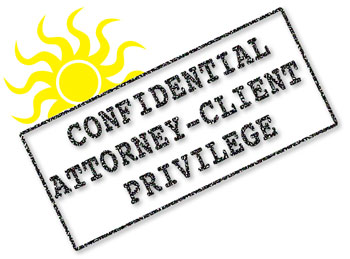Since 1977, Jon Michael Probstein has assisted people and businesses in all matters. In accordance with the Rules of Professional Conduct, this may be deemed "Attorney Advertising". Nothing contained herein should be construed as legal advice. Admitted in New York and Massachusetts. Always consult a lawyer regarding any matter. Call 888 795-4555 or 212 972-3250 or 516 690-9780. Fax 212 202-6495. Email jmp@jmpattorney.com
Tuesday, January 30, 2018
ATTORNEY CLIENT PRIVILEGE NOT WAIVED BY THIRD-PARTY PRESENCE
Saint Annes Dev. Co. v Russ, 2018 NY Slip Op 00451, Decided on January 24, 2018, Appellate Division, Second Department:
"The plaintiff objected to certain of the defendants' discovery requests on the ground that the requested documents, which related to communications among the plaintiff, its attorney, and its assignors, were protected by the common-interest privilege. The defendants moved to compel the production of these documents, arguing that the common-interest privilege did not apply. Following an in camera review of the documents, the Supreme Court denied the defendants' motion.
The common-interest privilege is an exception to the traditional rule that the presence of a third party waives the attorney-client privilege (see Hyatt v State of Cal. Franchise Tax Bd., 105 AD3d 186, 205; Aetna Cas. & Sur. Co. v Certain Underwriters at Lloyd's, London, 176 Misc 2d 605, 611 [Sup Ct, NY County], affd 263 AD2d 367; In re Quigley Co., 2009 WL 9034027, *2-3, 2009 Bankr LEXIS 1352, *7-8 [Bankr SD NY]). To fall within that exception, the privileged communication must be for the purpose of furthering a legal, as opposed to a commercial, interest common to the client and the third party (see Hyatt v State of Cal. Franchise Tax Bd., 105 AD3d at 205; Delta Fin. Corp. v Morrison, 69 AD3d 669; U.S. Bank N.A. v APP Intl. Fin. Co., 33 AD3d 430, 431). "The legal interest that those parties have in common must be identical (or nearly identical), as opposed to merely similar" (Hyatt v State of Cal. Franchise Tax Bd., 105 AD3d at 205; see United States v Doe, 429 F3d 450, 453 [3d Cir]; F.D.I.C. v Ogden Corp., 202 F3d 454, 461 [1st Cir]). Moreover, the communication must "relate to litigation, either pending or anticipated, in order for the exception to apply" (Ambac Assur. Corp. v Countrywide Home Loans, Inc., 27 NY3d 616, 620; see Hyatt v State of Cal. Franchise Tax Bd., 105 AD3d at 205).
Here, the Supreme Court properly denied the defendants' motion to compel the production of the subject documents, as these documents were protected by the common-interest [*2]privilege."

No comments:
Post a Comment
Note: Only a member of this blog may post a comment.